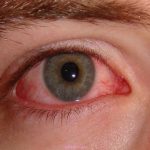 Nyctalopia. Inability to see in dim light as a result of vitamin A deficiency.
Nyctalopia. Inability to see in dim light as a result of vitamin A deficiency.
First symptom of vitamin A deficiency. The individual is unable to adapt to changes in light intensity. It is reversible if the vitamin is provided.
Abnormal reduction in vision in darkness, due to deficiency of vitamin A or to retinal disorder; also called nyctalopia.
Difficulty seeing in dim light. Night blindness primarily affects the person’s ability to perform tasks such as driving a car after nightfall. The condition can be related to nearsightedness or a birth defect, or it may be caused by a cataract (cloudiness in the lens of the eye), glaucoma (an increase in fluid pressure within the eye causing damage to the optic nerve), or retinitis pigmentosa (hereditary degeneration of the retina, the light-sensitive layer at the back of the eye). Night blindness can also be caused by a dietary deficiency in vitamin A (beta carotene), but this problem is rare in the United States. A person with night blindness should report the condition to his or her physician if it limits lifestyle or if it is accompanied by other unexplained symptoms.
Poor vision under low light conditions. Numerous individuals experiencing night blindness exhibit no evident ocular disorders. This condition could arise from an inherent functional flaw within the retina (the light-sensitive inner layer located at the rear of the eye), serve as an early indicator of retinitis pigmentosa (the degeneration of light-sensitive retinal cells), or stem from a deficiency in vitamin A.
